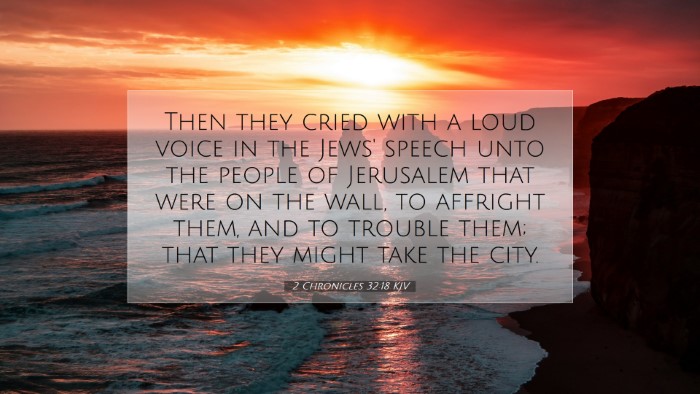Commentary on 2 Chronicles 32:18
Verse Context: 2 Chronicles 32:18 states, “Then they cried with a loud voice in the Jews’ speech unto the people of Jerusalem that were on the wall, to affright them, and to trouble them; that they might take the city.” This verse occurs during the Assyrian siege of Jerusalem, highlighting the psychological warfare employed by Sennacherib's envoys against the inhabitants of the city.
Historical Background
This period is marked by Sennacherib's campaign against Judah and particularly Jerusalem, as King Hezekiah reigned with a firm commitment to God amidst rising tensions. The Assyrian army was feared for its military prowess, and Sennacherib's approach was not merely to conquer but also to demoralize his enemies.
Commentary Insights
Matthew Henry’s Commentary
Henry emphasizes the audacity of the Assyrians in openly challenging God's people, illustrating how they tried to instill fear by using the leaders’ own language. This tactic was meant to unsettle the hearts of the besieged, but it showcases the enemy's awareness of the psychological dynamics of warfare.
- Fear as a Weapon: The envoys' loud cries were designed to intimidate the people of Jerusalem. Henry notes that fear can lead even the strong to falter.
- Divine Protection: Despite the threatening circumstances, Henry reminds us that God’s protection over Jerusalem was assured through Hezekiah's faith and prayer.
- The Nature of Despair: The purpose of such intimidation was not only to conquer physically but to break the spirit of resistance, a tactic frequently employed by oppressive regimes.
Albert Barnes’ Notes
Barnes introduces additional details on the rhetoric used by the Assyrian envoy, which aimed to undermine confidence in God. He explains that their arguments were calculated to provoke despair among the people.
- Linguistic Strategy: By speaking in Hebrew, the Assyrians sought to decrease the morale of the defenders, emphasizing the clumsiness of their own plans against divine sovereignty.
- Appeal to Reason: The Assyrians questioned God's ability to save them, attempting to shake the foundation of Hezekiah's trust in divine intervention.
- Understanding Propaganda: Barnes likens this event to modern propaganda, where misinformation is used to sway public opinion and sow discord.
Adam Clarke’s Commentary
Clarke provides a deeper analysis of the theological implications of this confrontation. He notes that this moment encapsulates a significant spiritual battle that underlines the faithfulness of God as opposed to the external threats posed by the Assyrian army.
- Spiritual Warfare: Clarke stresses that our struggles often mimic these ancient conflicts, where belief systems clash more violently than swords.
- Hope in Darkness: The faith of Hezekiah’s people is a reminder that steadfastness in the face of ridicule and fear is crucial for spiritual victory.
- God's Sovereignty: Even when the odds seem insurmountable, Clarke assures readers that God remains in control, often visible when His people are faithful.
Theological Implications
- Faith and Fear: This verse starkly contrasts the fear that paralyzes human hearts against the fearless faith exemplified by Hezekiah and the remnant in Jerusalem.
- The Role of Language: The use of language as a tool of warfare exposes modern applications of rhetoric in theology, culture, and politics.
- The Power of Prayer: Following this account, Hezekiah's prayer to God becomes a focal point of reliance—demonstrating that divine aid often comes most assuredly during times of distress.
Application for Today
For contemporary believers, 2 Chronicles 32:18 serves as a pertinent reminder that the voices of opposition may grow loud, but those who remain steadfast in faith have the assurance of God's protection and deliverance.
- Encouragement in Trials: Just as Hezekiah directed the people’s focus away from fear towards reliance on God, so too should modern believers strengthen their communities through faith during distress.
- Awareness of Psychological Warfare: Understanding the tactics of those who oppose faith can prepare believers to stand firm and present a united front against doubt and fear.
- The Importance of Community: The collective strength of the people of Jerusalem underscores the value of community in supporting one another during trials.
Conclusion
In an analysis of 2 Chronicles 32:18, one finds invaluable lessons on courage, the nature of spiritual warfare, and the significance of faith amidst opposition. The insights provided by long-standing commentaries illuminate the passage, encouraging theologians, pastors, and students of Scripture to remember that God is a fortress in times of trouble.


